|

|

|
|
沙羅曼蛇 サラマンダ
©Konami 1987
Release: 1987-09-25 (¥4900)
Cartdridge RC821
Shooter
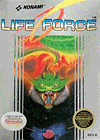

|
Released in America as
LIFE FORCE
( NES-LF-USA )
|
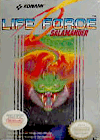

|
Released in Europe as
LIFE FORCE SALAMANDER
( NES-LF-XXX )
|
|
Salamander (aka Life Force in the west) is an horizontal shooter by
Konami and conversion of their own arcade game originally released in 1986.
The galactic entity Zelos is dangerously approaching planet Latis.
The space monster's appetite is growing and he is devouring everything on its path.
The player on board the Vic Viper and a partner on board the Lord British
star fighter fly to Zelos's lair in an attempts to destroy the invader. This port
of Salamander borrows its weapon system from Gradius - unlike the original
arcade game which featured a more traditional and straightforward power-up system.
A power-bar at the bottom of the screen displays available weapons and power capsules
must be collected to activate them. There are six type of upgrades - speed up,
missiles, ripple lasers, plutonic laser, options and shield.
Options are at the core of the gameplay and mimic the ship's motion and
attacks - they are also invulnerable and can withstand enemy bullets. However,
losing a life also means losing all the painfully accumulated upgrades. The game
features six zones and alternates between horizontal and vertical scrolling levels - they
also all end with intense boss battles in the most venerable shooting traditions.
|
|
This Famicom port of Salamander is different than the original
arcade game. It is a mix of both the Japanese Salamander and the American
Life Force topped with exclusive content.
See Salamander (PC Engine) for more information.
|
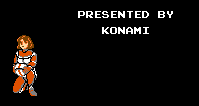 Interestingly, the NES and Famicom versions of the game have
different endings! The American version ends on a simple Konami
trademark logo whereas the Japanese version has a game credit roll and
reveals that the Vic Viper's pilot is in reality a brown-haired girl!
(picture on the right)
Interestingly, the NES and Famicom versions of the game have
different endings! The American version ends on a simple Konami
trademark logo whereas the Japanese version has a game credit roll and
reveals that the Vic Viper's pilot is in reality a brown-haired girl!
(picture on the right)
|
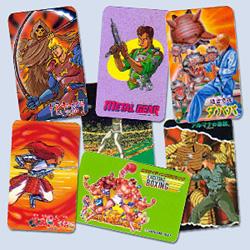 Like several other early Konami games released in the 1980s/1990s, Salamander
included a numbered collector card also known in Japan as コナミ キャラカード (aka 'Konami Chara Cards' or 'Konami Character Cards').
Each card featured an illustration or a snapshot
from the game (picture on the right), and the back of each card showed a serial number as well as the
game's title. They were randomly included with the games and Konami
produced several variations of each card. That's it, each game included a
card from a series related to the game, it is however not known
how many different card variations were made for each game.
Apparently six cards (on average) were produced for each game, except
for Doremikko (1 card), Exciting Boxing (1 card) and Meikyujin Dababa
(which, curiously, only seem to feature five cards).
The list of
Konami games to include such cards are believed to be :
Ai Senshi Nicol (FDS),
Dracula II Noroi no Fuin (FDS),
Arumana no Kiseki (FDS),
Contra (FC),
Doremikko (FDS),
Dragon Scroll (FC),
Exciting Baseball (FDS),
Exciting Basketball (FDS),
Exciting Billard (FDS),
Exciting Boxing (FDS),
Exciting Soccer (FDS),
Falsion (FDS),
Getsu Fūma Den (FC),
Majō Densetsu II Daimashikyō Galious(FC),
Meikyū Jiin Dababa (FDS),
Metal Gear (FC),
Salamander (FC),
Tetsuwan Atom (FC),
Top Gun (FC)
and Wai Wai World (FC).
Like several other early Konami games released in the 1980s/1990s, Salamander
included a numbered collector card also known in Japan as コナミ キャラカード (aka 'Konami Chara Cards' or 'Konami Character Cards').
Each card featured an illustration or a snapshot
from the game (picture on the right), and the back of each card showed a serial number as well as the
game's title. They were randomly included with the games and Konami
produced several variations of each card. That's it, each game included a
card from a series related to the game, it is however not known
how many different card variations were made for each game.
Apparently six cards (on average) were produced for each game, except
for Doremikko (1 card), Exciting Boxing (1 card) and Meikyujin Dababa
(which, curiously, only seem to feature five cards).
The list of
Konami games to include such cards are believed to be :
Ai Senshi Nicol (FDS),
Dracula II Noroi no Fuin (FDS),
Arumana no Kiseki (FDS),
Contra (FC),
Doremikko (FDS),
Dragon Scroll (FC),
Exciting Baseball (FDS),
Exciting Basketball (FDS),
Exciting Billard (FDS),
Exciting Boxing (FDS),
Exciting Soccer (FDS),
Falsion (FDS),
Getsu Fūma Den (FC),
Majō Densetsu II Daimashikyō Galious(FC),
Meikyū Jiin Dababa (FDS),
Metal Gear (FC),
Salamander (FC),
Tetsuwan Atom (FC),
Top Gun (FC)
and Wai Wai World (FC).
|
Teaser text from the American version:
Calling all Viper Pilots
- the galaxy's on the
edge of doom again!
You've saved the innocent
people of Gradius from the
vile Bacterions. But now an
even deadlier plague has
slimed into the neighborhood.
It's Zelos, an all-engulfing,
planet-eating alien who's
hungering to take a bite out
of you!
Only this time you don't
have to rescue the millions of
Gradians alone. You can call
on a starfighter friend from
the planet Latis, who'll fight
beside you in his RoadBritish
space destroyer.
You'll both be gunning for
max power-ups, with ripple
lasers, plutonic missiles and
impregnable force fields.
But you better be on target.
For this isn't your ordinary
space scum. And to crush him
you've gotta soar through his
guts, blast past his death traps
and ultimately blow out his
heart.
Good luck, Commander. The
Galaxy's counting on you!
|
Game Staff (Copied from the end credits) :
|
STAFF
Programmed By
S. Umezaki
T. Danjyo
H. Hori
H. Yanagisawa
|
|
Character Design
S. Muraki
Y. Yoshimoto
C. Ozawa
J. maruo
Music by
S. Sakamoto
S. Terashima
H. Maezawa
A. Fujito
|
|
Visual Design
K. Shimoide
N. Satoh
Special Thanks
H. Machiguchi
|
|
Directed by
S. Umechan
and
Osetsusan
Presented by
Konami
|
|
G
O
O
D
I
E
S
|
|
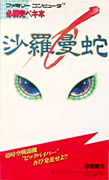
Japanese Guidebook
|
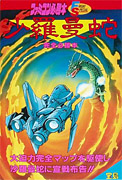
Japanese Guidebook
|
|
|
O
M
A
K
E
|
|
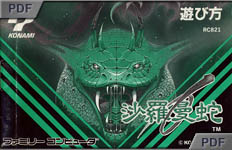
|
|
|
Click on picture to enlarge |
|
|
|
LK

|
|
Add your Pov here !
|
P
O
V
s
|
|
Salamander is magnificent in so many ways. The game's cartridge and
its transparent shell casing (sorry, this delightful treat only applies to the
Famicom release) makes you realize that you are about to experience
something special. The first thing that blew me away are the
graphics - the level of detail is incredibly impressive and the enemy
sprite animations are simply superb. It's actually hard to believe that
the game is running on the trusty old Famicom hardware. However,
the experience is unnecessarily hard in a way that exceeds my patience
endowment. I feel that the only way to master Salamander is through
weeks/months of steady practice. Despite the frustration and repeated failures,
Salamander is a game I revisit frequently. An excellent and dazzling shooter.
|
|
|
|